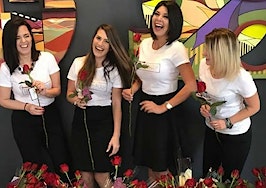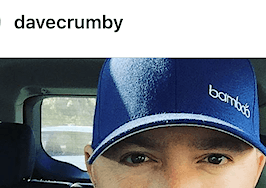- You need to start planning a big event at least 60 days in advance.
- Get invitations directly into the hands of children for kid-friendly events.
- Don't rely on free entertainment (like face painting or balloon animals) -- in some cases, it really pays to hire a professional.
If you haven’t started thinking about your Fourth of July event, then you’re probably not expecting hundreds of people to show up.
However, if you’re Amy Parry, CEO at Closing Alliance and party person extraordinaire in St. George, Utah, then you know that a big turnout requires planning — lots of planning.
Parry had about 600 people show up to her annual Easter egg hunt this year, and the next one up is the Fourth of July, which she says she’s hoping to take to “Easter level.”
How does she do it?
Getting started
Parry’s Easter egg hunt wasn’t something she launched herself — but she was able to leverage a good thing when she saw one. “A friend of mine started it as a neighborhood get-together,” Parry explained, and she helped her friend out the first year.
“That was 20 or 25 kids and no parents showed up,” Parry remembered. “The next year it got a little bigger and some parents showed up … last year it was probably close to 500 people, and that’s when we started pulling in the sponsors.”
Parry’s other big annual event is a Fourth of July barbecue — which she’s about to start planning in just a few days. “That one is just so easy,” she said; “we put up signs on the mailboxes that say ‘Neighborhood Barbecue,’ and then we do a pot luck, so it costs nothing.”
Don’t let that fool you, though — Parry still puts a lot of thought into that pot-luck party. You need 60 days to put an event like this together, following her timeline, so if this sounds like fun, you’ve got just enough time to jump on the bandwagon for the nation’s annual celebration of independence.
Planning the event: Easter eggs (and Fourth of July)
Here is Parry’s full event plan for her annual Easter egg hunt:
60 days prior to event
- Gather invite list and list of locations to place/post announcements.
- Invite list should include all past clients and prospects (include mailing list as email list).
- Sponsors and other real estate agents in the office should gather invite lists, also.
- Arrange a location — for Easter, that’s ideally a local, centralized park with both a covered area and open park for the eggs; for the Fourth of July, a park would also be good, but you could also close off a street, use a cul-de-sac or even plan something in a big backyard if the event’s on the smaller side
- Obtain a park permit, if necessary.
- Call your local parks department. Parry estimates their fees run between $40 and $250, depending on what she needs.
- Ask the parks department if you will need security for your event — some parks/locations will require it. (Churches or Scout organizations might be willing to help you find cheap or free security.) Consider parking, too.
- Set the date and time.
- Parry likes to plan her Easter egg hunt on the Saturday the weekend prior to Easter and thinks that 10 a.m. to 1 p.m. is optimal for families. You could plan your Fourth of July event either the weekend before or on the day of the event itself — but more people are likely to show on an “off” day. Late afternoon to early evening would be a good time for a Fourth party.
- If the event starts at 10, then wait until 10:30 or 11 for the actual egg hunt on Easter. The same principle applies to the Fourth of July fireworks — it’ll need to be dark outside, so you might want to plan an “early” fireworks show for any small children and a big one later on.
- Gather potential sponsor list.
- This should include mortgage lenders, title companies, attorneys and local professionals, such as dentists, local stores, decorators, contractors and so on.
- Give sponsors the option to hang a sign and attend the event to meet people.
- They can also donate money, supplies, their time or prizes — possibly for a sign-in raffle.
- Plan the day’s activities. Some options for Easter:
- Egg hunt
- Egg toss
- Egg roll
- Basket making
- Coloring contest
- “How many jelly beans are in that giant jar?” game
- Easter Bunny photo opportunities
- Call a professional and make reservations for this one
- You can book just the bunny, or a bunny and a photographer, too
- Face painting (again, hire a professional for this one)
- Balloon animals (another professional job)
- “Bunny” races (sack races with a new name!)
- You’ll need a sack supply for this one
- Music
- Hire a DJ or plan to have music playing at a centralized place for announcement
- This is especially useful for lost Easter bunnies
- Food
- You have a couple of options here: You can contact a caterer …
- Or you can barbecue
- Sign-in raffle
- This way you can collect names and contact information
- A sponsor might be able to provide a prize — if not, you’ll need to find one; it will encourage signing in at the event
- Some options for the Fourth:
- Fireworks! Check with your local fire departments to make sure you’re complying with fire codes, though.
- A chili cook-off
- “How many jelly beans are in that giant jar?” game
- Coloring contest for kids
- Face painting (again, hire a professional for this one)
- Balloon animals (another professional job)
- Sack races (don’t forget the sack supplies!)
- Inflatable play areas for kids
- Family photo booth
- Three-legged races
- Music
- Hire a DJ or plan to have music playing at a centralized place for announcement
- This is especially useful for lost kiddos
- Food
- You have a couple of options here: You can contact a caterer …
- Or you can barbecue
- Sign-in raffle
- This way you can collect names and contact information
- A sponsor might be able to provide a prize — if not, you’ll need to find one; it will encourage signing in at the event
30 days prior to event
- Send out invitations.
- Send your email invites.
- Post invitations in offices, local community boards, schools, church and on mailboxes in neighborhoods where you’re prospecting (as allowed).
- The invitations should be open to everybody. All invitations or ads for the event should include your branding, contact information, the event date and time and location, and any additional activity information that you think should be included. (For example, include a “BYO Fireworks” notice on your Fourth of July invite.)
- Expect a 15 percent to 20 percent turnout for each contact that you make — so 1,000 invitations means you’ll probably see about 150 to 200 people. Plan accordingly!
- Start the purchases.
- For every child attending your Easter hunt, you should have a minimum of 15 eggs, but you probably ideally want closer to 20. Expect about three kids to show up for every adult in attendance in most areas.
- For every child and adult attending your Fourth of July, plan to provide sparklers — and maybe think about investing in some fireworks.
- Buy your candy and supplies for the activities.
- You can purchase plastic eggs in bulk online — pre-filled or empty.
One week prior to event
- Finish buying your food.
- Hot dogs, chips, cupcakes and waters are the easiest to clean up.
- The average person will eat three hot dogs.
- Buy individual bags of chips and bottles of water.
- Don’t forget — chocolate melts! Candy must be wrapped in a waterproof wrapping.
- Buy your paper products and clean-up materials.
- You will need napkins, table covers, folding tables, signage and extra chairs for helpers.
- Vendors can bring their own tables and chairs — confirm with them.
- Meet with sponsors and volunteers, and confirm all vendors (your balloon and face-painting artists, for example).
- Confirm the raffle prize for signing in.
The day before the event
- For Easter: Make sure the eggs are filled and ready for hiding.
- Send an email reminder about the event.
- Prepare your signs and tables.
- Map out the park or space with vendor and food areas and areas for games so everyone knows what’s where.
The day of the event
- Buy your ice and place drinks in coolers.
- Pick up helium balloons to tie to signs so people know where they’re going.
- Arrive on-site one to two hours prior to set up and meet with vendors or sponsors.
- Place signs and set up the tables.
- You should have a business table with your company’s information and branding.
- Lenders could offer prequal tables, and title could offer a property profile table.
- Set up a table with that weekend’s open houses, too.
- Set up the DJ or music/announcement area.
- Set up a sign-in table — so you can track how many people attended and collect contact information.
- For Easter:
- Place eggs and set up signs according to age groups (2 and under; 3 to 4; 5 to 6; 7 to 8; 9 to 10; 11 to 12)
- Lay eggs on grounds in a sectioned off area. Eggs will be everywhere! (For older kids, feel free to hid eggs in a wooded area — if safe and a part of the park.)
- Start preparing food and setting out condiments and paper products.
- Decorate with balloons
It starts!
- Ask everyone to sign in at the front table.
- Sign in should include cell numbers for future marketing.
- Children’s names and ages should also be gathered (if parents are comfortable with it) in case a child and a parent gets separated.
- Ask how they heard about the event so you know what works in the future.
- For Easter: The egg hunt should start about half an hour to an hour after the event itself has begun.
- Let the youngest kids go, then the next age group and so on.
- Leave a box out for empty eggs so you can collect the shells and use them for next year. (After several years of doing this, Parry says she has around 10,000 refillable plastic eggs.)
- For the Fourth, fireworks should start after the sun sets, so think about doing some kind of early “sparkler” activity for kids who won’t be able to last all day.
- Have fun!
Things to consider
Christmas events can also be fun, Parry notes — “but that one has to be limited because it almost has to be indoors,” depending on where in the world you live.
She’s also done a Halloween event with movies and businesses that volunteer to hand out candy to the kids.
She’s thinking about possibly renting some bounce houses for the kids for this Fourth of July — after all, one way to get a consistent turnout of adults at any event is to make it appealing for kids.
Parry says that she always drops invitations for the Easter egg hunt off at the local schools. “The kids will tell their parents that they’re going,” she laughed.
For the Fourth of July, since school’s not in session, she’s thinking about reaching out to some of the bigger companies in St. George and let their human resources departments know that the barbecue is happening and that all of the company’s employees and employees’ families are welcome to come.
And if you’re stuck for a space, Parry says that some elementary and middle schools just require you to secure an insurance policy (which is relatively cheap) in order to use their spaces, so that could be an option.
Parry doesn’t use Facebook as a big promotional tool for these events. “We do it more word-of-mouth,” she noted. For Easter, “We sent out two emails, and we printed a lot of fliers and took those to the schools in the areas we want to target.” She won’t stop any of her event partners from blasting on social media, but it’s not her focus.
One tip: Get a professional — a real-deal honest-to-goodness pro — for any face painting or balloon animal artistry that you’re commissioning for the kids. “When you hire those professionals, they set it all up for you and take care of everything,” she explained (and the results are a lot better than even the most talented amateur’s).
And don’t forget about the grown-ups: Parry says that next year, she might dip her toes into the waters of an “adult Easter egg hunt.”
“I was thinking we’d give everyone a chance to dress up, have it at a bed-and-breakfast with a really nice backyard or at a high-end house for sale, and invite potential buyers for that home and let them see it that way. There would be eggs hidden that have very nice prizes in them, anything from cute earrings and jewelry to $200 gift cards.”
She’s also thinking about putting a “golden egg” at just one (mystery) listing next Easter and giving snowbird clients an opportunity to win some kind of grand prize if they find it on a house tour. “I think it’ll encourage people to come out and look at houses,” she said. “We’ll let people know which houses are on the ‘golden egg’ list — and what better way to encourage them than with a grand prize?”












